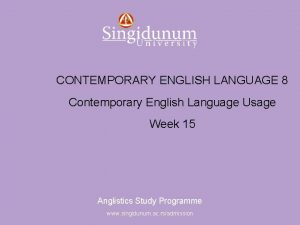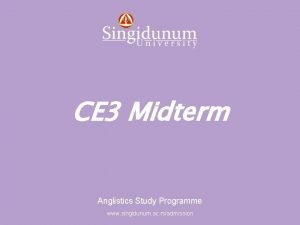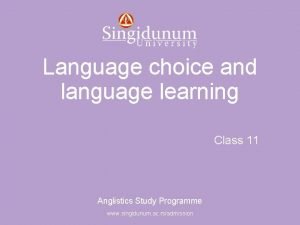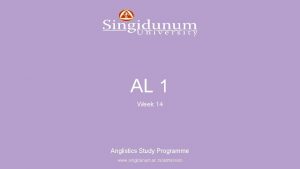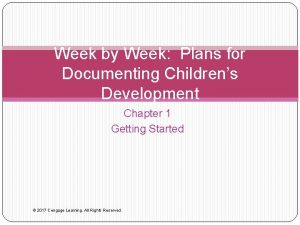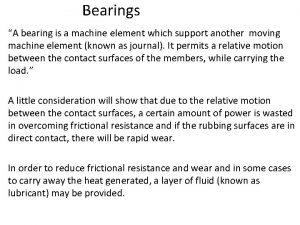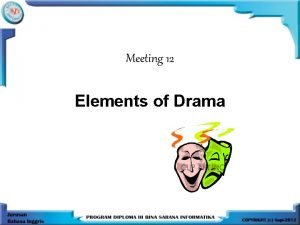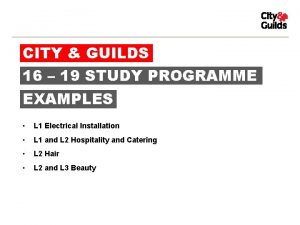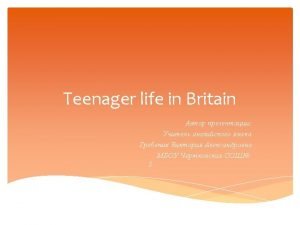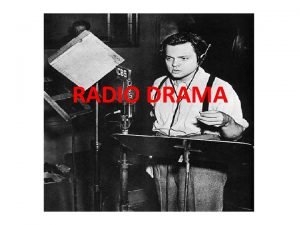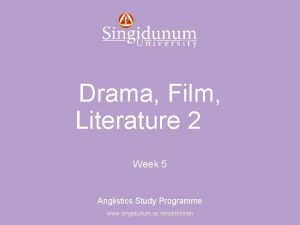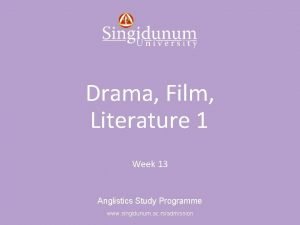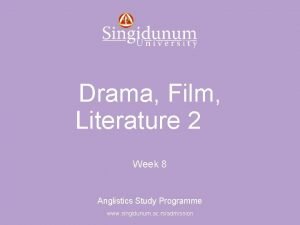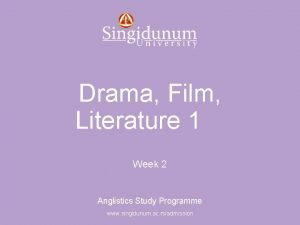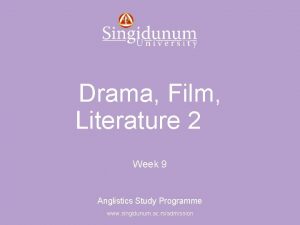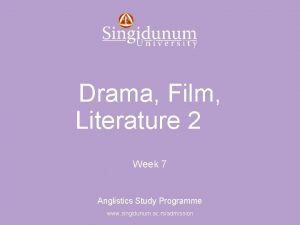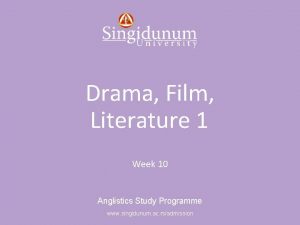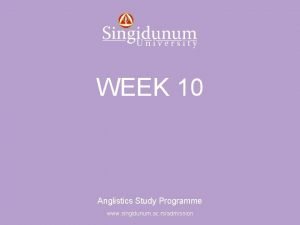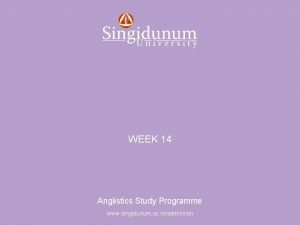Anglistics Study Programme Drama Film Literature 2 Week










- Slides: 10

Anglistics Study Programme Drama, Film, Literature 2 Week 14 Anglistics Study Programme www. singidunum. ac. rs/admission

Anglistics Study Programme Victorian Period (1840 – 1890) • the period following the Romantic era was one of rapid change in the social circumstances of the English society • slavery was denounced (British colonies were officially rid of it in 1833) • it was an age of progress – with the extension of machinery, mass production became a reality and this further led to mass population • nevertheless, this prosperity brought along too much poverty, too much injustice, too much ugliness, and too little certainty • with all its ideals, this was a curiously puritanical age – an age of conventional morality (large families with the father as a godlike head, and the mother as a submissive creature • the strict morality, the holiness of family life, owed a good deal to the example of Queen Victoria herself, and her indirect influence over literature, as well as social life, was considerable

Anglistics Study Programme Victorian poetry • poetry was not that popular during the Victorian era, possibly due to the fact that form, and not content, was the prevailing element in Victorian poetry • the quote from Mathew Arnold pretty much sums up the situation in prose of the period. Namely, he said that “The energy of Romantic literature persists, but it is channelled into a stricter concern for disciplined forms. ” • nevertheless, some of the major Victorian poets are: Alfred, Lord Tennyson (In Memoriam, Idylls of the King, The Princess, etc. ) Robert Browning (Pippa Passes, My Last Duchess, etc. )

Anglistics Study Programme Victorian novel • the Victorian novelists realized that life was real, earnest, and that they were morally (as well as artistically) obligated to address themselves to the newer and more serious problems created by industry and technology, by the challenge of the new science to theology and morality, by the uprooting of large masses of the rural and provincial population, by the exploding urban areas, and by a growing literacy and awareness of man’s role in society • Victorian Age was a period of ideas, not feelings; material achievements not aesthetic ones • the novelists were more sensitive to the changing industrial and political scene than were many of the other writers in literary forms • some characteristics of the Victorian literature include: high moral purpose, the language was rich and highly ornamental, moral subjects, disappointment over the unrealized great hopes entertained of science and intellectual progress

Anglistics Study Programme Victorian novel (cont. ) • Victorian novelists were primarily concerned with the impact on human experience of “manners, morals, and money”. • novels reflected mercantile or materialistic point of view, whether it be in love, marriage or pursuit of a profession • the novel of the 19 th century was broader and more complex because of the greater complexity of the life which it attempted to portray • women novelists also became more present on the literary scene of England

Anglistics Study Programme Charles Dickens (1812 – 1870) • one of the giant literary figures produced by the 19 th century • the world created in his novels is mainly a kind of nightmare London; it is dark and cold, but very much alive • Dickens’s novels are all animated by a sense of injustice and personal wrong • Dickens is concerned with the problems of crime and poverty, but, at the same time, he seems not to believe that matters can be improved by legislation or some reforms – in his novels, everything depends on an individual, usually the wealthy philanthropist • he is primarily concentrated on the social conditions of his own day

Anglistics Study Programme Charles Dickens (cont. ) • Some faults of Dickens as some critics argue are: inability to construct a convincing plot (not the case with his later novels) his sentimentality lack of real characters • nevertheless, all this fades in comparison to a special Dickensian world which, if it does not resemble the real world, at least has its own logic and laws and its own special atmosphere

Anglistics Study Programme Charles Dickens (cont. ) • Characterization in Dickens’s novels – his characters comprise three main types: the purely humorous caricatures characters created not to excite loathing and horror the victim of society, usually a child laughter, but

Anglistics Study Programme William Makepeace Thackeray (1811 – 1863) • unlike Dickens, Thackery wrote of the upper classes and was antiromantic • he counteracted the sentimental, sensational, message-packed novels of Dickens • his most notable novel was Vanity Fair – the novel was published in instalments, like most of the period, and that can account for its poorly-knit not tight structure • Though it revolves around the Battle of Waterloo and the Napoleonic Wars, to Thackeray historical event itself was not that important, as it was the way it shed a light on common affairs of men and women – he brought a realist’s point of view to the historical novel

Anglistics Study Programme George Eliot (1819 – 1890) • her real name was Mary Ann Evans, but she wrote under the pseudonym of George Eliot • some of her significant novels were: The Mill on the Floss, Middlemarch, Adam Bede, etc. • unlike Dickens, she mostly dealt with country people in her novels • nevertheless, she managed to portray and analyse human conduct, to show moral consequences of even trivial actions, and to show the minds of even humble people can be made noble through suffering • though, personally, she was not interested in Christianity and preferred German philosophy, she showed sympathy for the faith of others and she was always concerned with moral problems
